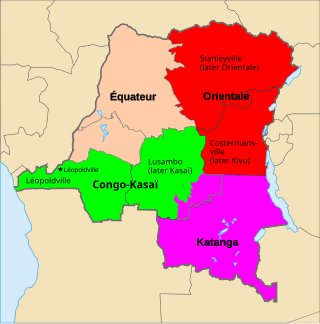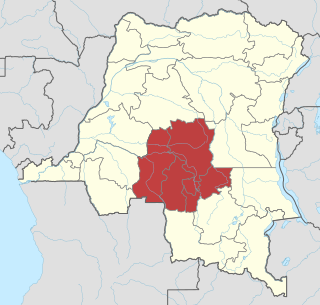| |||||
| Decades: | |||||
|---|---|---|---|---|---|
| See also: | Other events of 2017 History of the DRC | ||||
The following lists events in the year 2017 in the Democratic Republic of the Congo .
| |||||
| Decades: | |||||
|---|---|---|---|---|---|
| See also: | Other events of 2017 History of the DRC | ||||
The following lists events in the year 2017 in the Democratic Republic of the Congo .

The earliest known human settlements in what is now the Democratic Republic of the Congo have been dated back to the Middle Stone Age, approximately 90,000 years ago. The first real states, such as the Kongo, the Lunda, the Luba and Kuba, appeared south of the equatorial forest on the savannah from the 14th century onwards.

Politics of the Democratic Republic of Congo take place in the framework of a republic in transition from a civil war to a semi-presidential republic.

Katanga was one of the four large provinces created in the Belgian Congo in 1914. It was one of the eleven provinces of the Democratic Republic of the Congo between 1966 and 2015, when it was split into the Tanganyika, Haut-Lomami, Lualaba, and Haut-Katanga provinces. Between 1971 and 1997, its official name was Shaba Province.

The Democratic Republic of the Congo is a country in Central Africa. By land area, the Congo is the second-largest country in Africa and the 11th-largest in the world. With a population of around 109 million, the Democratic Republic of the Congo is the most populous Francophone country in the world. The national capital and largest city is Kinshasa, which is also the economic center. The country is bordered by the Republic of the Congo, Central African Republic, South Sudan, Uganda, Rwanda, Burundi, Tanzania, Zambia, Angola, the Cabinda exclave of Angola, and the South Atlantic Ocean.

Joseph Kabila Kabange is a Congolese politician who served as President of the Democratic Republic of the Congo between January 2001 and January 2019. He took office ten days after the assassination of his father, President Laurent-Désiré Kabila in the context of the Second Congo War. He was allowed to remain in power after the 2003 Pretoria Accord ended the war as the president of the country's new transitional government. He was elected as president in 2006 and re-elected in 2011 for a second term. Since stepping down after the 2018 election, Kabila, as a former president, serves as a senator for life.

The Kasaï region is a geographic and cultural region in south-central Democratic Republic of the Congo. Once a single province, it now comprises the provinces of Kasaï Province, Kasaï-Central, Sankuru, Kasaï-Oriental, and Lomami Province. It shares its name with the Kasai River.

Étienne Tshisekedi wa Mulumba was a Congolese politician and the leader of the Union for Democracy and Social Progress (UDPS), formerly the main opposition political party in the Democratic Republic of the Congo (DRC). A long-time opposition leader, he served as Prime Minister of the country on three brief occasions: in 1991, 1992–1993, and 1997. He was also the father of the current President, Felix Tshisekedi.
Societé minière de Bakwanga is a diamond mining company based in the Democratic Republic of the Congo. Historically, the company was the largest diamond producer in the world by volume. However, following decades of decline, the company currently produces only a small minority of the DRC's diamonds.
Dibaya is a small town in Kasai-Central province of southern Democratic Republic of the Congo. As of 2009 it had an estimated population of 5,213. Dibaya has an airport with regular flights to Kinshasa, Kikwit and Angola.

The CongoleseRepublican Guard of the Democratic Republic of the Congo, formerly known as the Special Presidential Security Group, is a praetorian guard unit maintained by and tasked to protect the Congolese president Félix Tshisekedi. Congolese military officials state that the Republican Guard (GR) is an independent branch and not the responsibility of FARDC, but the Head of State. Apart from Article 140 of the Law on the Army and Defence, no legal stipulation on the DRC's Armed Forces makes provision for the GR as a distinct unit within the national army. In February 2005, President Joseph Kabila passed a decree which appointed the GR's commanding officer and 'repealed any previous provisions contrary' to that decree. The GR is more than 10,000 strong, and formerly consisted of three brigades, the 10th, at Kinshasa, the 15th, and the 16th, at Lubumbashi. It has better working conditions and is paid regularly, but still commits numerous crimes near their bases, including against United Nations officials.

Dan Gertler is an Israeli billionaire businessman in natural resources and the founder and president of the DGI group of companies. Until 2022, He had diamond and copper mining interests in the Democratic Republic of the Congo (DRC), and has invested in iron ore, gold, cobalt, oil, agriculture, and banking. As of 2024 his fortune was estimated at $1.5 billion by Forbes.
The Mutanda Mine is an open-pit copper and cobalt mine in the Lualaba Province of the Democratic Republic of the Congo (DRC). It is the largest cobalt mine in the world. Accidents and spills at the mine have killed workers and polluted nearby rivers and fields. An NGO that has documented impacts of the mine concluded that spills have threatened community members' right to food.

Senate elections were held in the Democratic Republic of the Congo on 14 March 2019 to elect the 108 Senators. Former DRC President Joseph Kabila, who stepped down from office in January 2019 following the inauguration of the recently elected Félix Tshisekedi, has also joined the upper house of the legislature as a senator for life, for a total of 109 seats.

General elections were held in the Democratic Republic of the Congo on 30 December 2018, to determine a successor to President Joseph Kabila, as well as for the 500 seats of the National Assembly and the 715 elected seats of the 26 provincial assemblies. Félix Tshisekedi (UDPS) won with 38.6% of the vote, defeating another opposition candidate, Martin Fayulu, and Emmanuel Ramazani Shadary, backed by the ruling party PPRD. Fayulu alleged that the vote was rigged against him in a deal made by Tshisekedi and outgoing President Kabila, challenging the result in the DRC's Constitutional Court. Different election observers, including those from the country's Roman Catholic Church, also cast doubt on the official result. Nonetheless on 20 January the Court rejected his appeal and declared Tshisekedi as the winner. Parties supporting President Kabila won the majority of seats in the National Assembly. Félix Tshisekedi was sworn in as the 5th President of the Democratic Republic of the Congo on 24 January 2019, making it the first peaceful transition of power in the country since it became independent from Belgium in 1960.
The following lists events that happened during 2016 in the Democratic Republic of the Congo.

The Kamwina Nsapu rebellion, also spelled Kamuina Nsapu rebellion, was an uprising that took place in the Democratic Republic of the Congo between 2016 and 2019. It was instigated by the Kamwina Nsapu militia against state security forces in the provinces of Kasaï-Central, Kasaï, Kasaï-Oriental, Lomami and Sankuru. The fighting began after the militia, led by Kamwina Nsapu, attacked security forces in August 2016.

The Republic of Angola and the Democratic Republic of the Congo share a 2,646 km border.

Félix Antoine Tshisekedi Tshilombo is a Congolese politician who has been the President of the Democratic Republic of the Congo since 24 January 2019. He is the leader of the Union for Democracy and Social Progress (UDPS), the DRC's oldest and largest party, succeeding his late father Étienne Tshisekedi in that role, a three-time Prime Minister of Zaire and opposition leader during the reign of Mobutu Sese Seko. Tshisekedi was the UDPS party's candidate for president in the December 2018 general election, which he was awarded, despite accusations of irregularities from several election monitoring organisations and other opposition parties. The Constitutional Court of the DRC upheld his victory after another opposition politician, Martin Fayulu, challenged the result, but Tshisekedi has been accused of making a deal with his predecessor, Joseph Kabila. The election marked the first peaceful transition of power since the state became independent from Belgium in 1960.
Events in the year 2021 in the Democratic Republic of the Congo.

Formal diplomatic relations between Israel and the Democratic Republic of Congo have existed since 1962. Both countries are members of the United Nations. In 1973, like the majority of African countries that previously recognized Israel, Zaire decided to break its relations with Israel after the Yom Kippur War, but reestablished them, unlike other African countries, in the early 1980s.
{{cite news}}: |archive-date= requires |archive-url= (help)